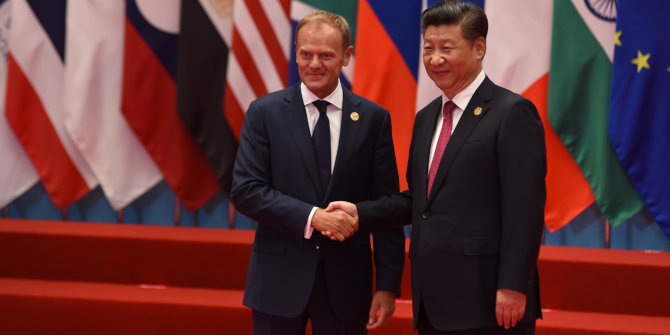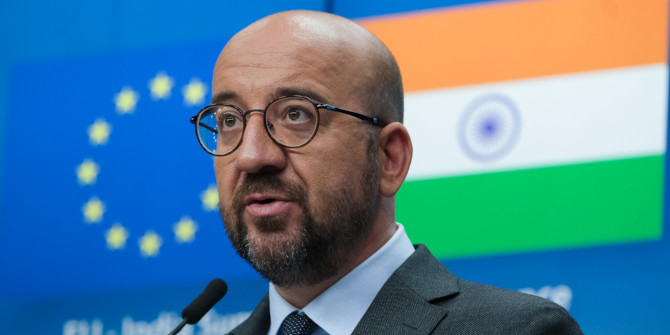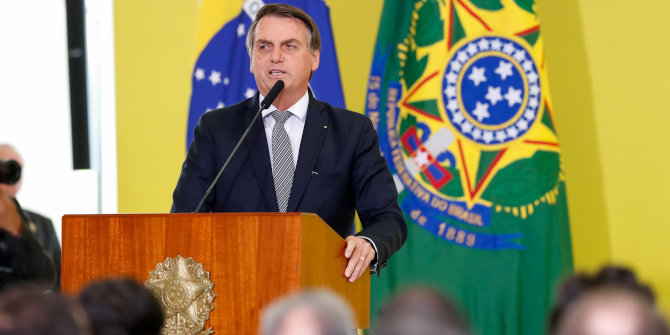 On 14 December 1995, the Dayton Agreement was formally signed in Paris, bringing an end to the Bosnian War. On the 20th anniversary of the agreement, Jessie Hronesova assesses five key lessons on peace and state-building processes that can be taken from the Dayton experience. She writes that while inconsistencies and vague formulations in the agreement have done a great deal of harm to Bosnian governance, it would be unfair to pin all of the on-going struggles in Bosnia on to Dayton, with patronage, corruption and a lack of political willingness to reform being the root cause of many of these issues.
On 14 December 1995, the Dayton Agreement was formally signed in Paris, bringing an end to the Bosnian War. On the 20th anniversary of the agreement, Jessie Hronesova assesses five key lessons on peace and state-building processes that can be taken from the Dayton experience. She writes that while inconsistencies and vague formulations in the agreement have done a great deal of harm to Bosnian governance, it would be unfair to pin all of the on-going struggles in Bosnia on to Dayton, with patronage, corruption and a lack of political willingness to reform being the root cause of many of these issues.
The General Framework Peace Agreement for Bosnia and Herzegovina, also referred to as the Dayton Peace Accords, agreed on 21 November 1995 at Wright-Patterson base in Dayton, Ohio, and formally signed in Paris on 14 December 1995, ended the Bosnian War, which had raged from spring 1992 until the winter of 1995.
The Bosnian War remains the most brutal conflict in Europe in the period after World War II. Out of the pre-war 4.4 million Bosnian population, approximately 105,000 people lost their lives, just under 1.4 million were displaced and 1.2 million became refugees abroad. The peace talks in Dayton were the last attempt to end the conflict. All previous diplomatic efforts had failed until the US diplomat Richard Holbrooke gathered Slobodan Milosevic, Alija Izetbegovic and Franjo Tudjman, as well as several European and Russian diplomats, in the Wright-Patterson base, where they stayed for 21 days of negotiations.
The final agreement, often referred to simply as ‘Dayton’, was the result of skilful diplomacy, political trade-offs and the military pressure being exerted on the main warring parties. While Dayton was a path-breaking, war-ending and peace-keeping tool, it has not proven to be an effective framework for allowing true post-war peace-building and the political reconstruction of Bosnia and Herzegovina.
In many respects, Dayton was crucial in giving the new country a set of principles, rules and institutions. But it has failed to provide a universally backed direction capable of guiding Bosnia through the unchartered waters of democratisation and liberalisation – the two principles of liberal peace-building.
Given Dayton’s mixed results, it is important to assess the legacies of the agreement and the broader lessons for international policymakers in peace and state-building. With a war raging in Syria, on-going peace negotiations in Colombia and discussions concerning a war-crimes tribunal in South Sudan, such discussions are clearly timely. In this context there are at least five key lessons that can be taken from the Dayton experience.
The fallacy of complexity
By some accounts, the Dayton Agreement constitutes one of the most comprehensive peace agreements in the world. Its 150 pages cover topics from military consolidation, refugees and elections to the protection of national monuments and public corporations. Most importantly, Annex 4 represents the current Constitution of Bosnia and Herzegovina. It offers far-reaching ‘consociationalist institutions’ based on power-sharing, decentralisation, ethnic vetoes, and proportionality.
However, by anchoring the power of ethno-national voices in legislative and executive institutions, the Dayton constitution multiplied political platforms for the application of ethno-national principles, which fuelled the war. In addition, Dayton’s multi-tiered system of governance allowed for the development of an overburdening complexity of over 140 ministries and thirteen de facto semi-autonomous units (two entities, 10 cantons and the District of Brcko). At the same time, the central state was created as a weak overarching structure with only three central ministries.
This high level of complexity and decentralisation was driven by the nature of the tense negotiations that produced the agreement and was originally aimed at avoiding conflict. But it effectively weakened the central state and produced imprecise vertical and horizontal divisions of competences. Although the Bosnian constitution has since undergone several changes, the fundamental system established at Dayton has proved to be relatively resilient and continues to be the main obstacle for functional democratic development in the country.
People or peoples?

In addition to complexity, the Dayton Peace Accords have anchored our perception of Bosnia as a conglomerate of battling peoples rather than as a country of people just like any other state. Dayton upholds the principle of group-based rights in guaranteeing political representation to the three so-called constituent peoples (Bosniaks, Bosnian Croats and Bosnian Serbs) while at the same time guaranteeing individual rights. Those people living in Bosnia who do not belong to one of these three groups were effectively denied active citizenship, with implications for their ability to be elected to political office, among other issues.
In addition, the power-sharing principle of three peoples may even contradict Annex 7 of the Dayton Peace Accords, which guarantees all refugees and displaced people the right to return. This could lead to Bosnia becoming ‘multi-ethnic’ – the proclaimed policy of post-war external efforts in the country. In making the territorial domains of Bosniaks, Serbs and Croats multi-ethnic, however, the group-based rights within the constitution would lose their relevance.
This issue has been an on-going source of tension. Following a decision by the Constitutional Court in 2000, the constitutions of the two entities in the country (the Federation of Bosnia and Herzegovina and Republika Srpska) had to be amended as they did not represent all citizens, but only the majority constituent peoples in the two entities. One of the findings of the Venice Commission in 2005, which thoroughly assessed all the pending constitutional issues in the country, was also to reform the ethno-national principle of Dayton. But despite a ruling by the European Court of Human Rights in 2009 that the constitution violates individual political and civil rights, this has not been changed.
International peace and state-building
While calling Bosnia a democratic state, the Dayton agreement also includes provisions for the direct involvement and interventions of a series of international actors such as NATO (for the military), the OSCE (for elections), and the UNHCR (for refugees) without any sunset clause specifying when these provisions will end.
Dayton created the so called Office of the High Representative (OHR), which took over the task of building state capacities and institutions. The OHR progressed from an initial lukewarm implementation through a strong state-building period in the early 2000s. However it is now an institution which has been dying a slow death since 2006. This and other foreign agencies have been directly or indirectly involved in Bosnian post-war policy-making without nurturing the development of a democratic political culture. Instead, they have created a culture of dependency on international leadership.
In addition, with the exception of the clear mandate and role of NATO in the realm of the military, the various foreign agencies have been granted somewhat vague powers and areas of interest, which do not explain their priorities and cross-agency coordination. Again, Dayton lacked clear provisions for implementation with respect to these agencies. This resulted in patchy commitment to reforms and implementation, both from external and internal actors, and the loss of credibility and questionable legitimacy of any external interventions.
About us, without us
The Dayton negotiations took place behind closed doors. The constitution was written, borders were drawn and towns were assigned to one side or the other without any input from the beneficiaries of the process – the people of Bosnia. Of course, to deliver peace, it was necessary to act fast and efficiently and consulting the public was not feasible. But to build a state, it was not sufficient to simply convince the main leaders to sign, it was also necessary to convince the public that the agreement was necessary and temporary.
Indeed, it was not only the form of negotiations which left the public outside of the policymaking process. The vast majority of policy decisions, particularly in the sphere of social affairs, receive only limited input from the civil sector. As such, the Dayton constitution has effectively constrained the ability of citizens to influence central state affairs. Bosnian politics has typically been conducted behind the closed doors of ministries and the headquarters of political parties. Disquiet over the political process was expressed during protests in February 2014, which was only the first manifestation of citizens’ desire to play a more active role in the country’s politics.
Justice and peace
With over 70 references to human rights, 16 international conventions and commitments to cooperation with the International Criminal Tribunal for the former Yugoslavia, hopes were raised that Dayton would not only lead to peace, but would also ensure that the perpetrators of war crimes would be appropriately punished. Yet this was a difficult balance to strike as some of the main culprits of the conflict were also signatories.
International criminal prosecution could have jeopardised the outcome of the agreement, which was undoubtedly part of the thinking of Richard Holbrooke, who was careful about including the ICTY only where necessary. Ultimately, Dayton reasserted the existence of the ICTY and tasked NATO and the signatories with the delivery of those indicted by the Tribunal.
But rather than bringing about justice in the sense which the Bosnian population would have liked to see, ICTY was applied as a tool for political vetting and moderation: no person indicted by the Tribunal was allowed to run in elections. Dayton also remained silent over how to deal with the legacy of the atrocities carried out in the country.
This has had wide-ranging consequences in Bosnia, where the past is anything but over. Only a small number of individuals have been punished, truth commissions have never been successfully established and victims have not been compensated. While it could be argued that the role of peace agreements is not to deliver justice, but merely peace itself; the Bosnian case demonstrates that any positive peace – in the sense of sustainable peaceful relations – is impossible without fully confronting the crimes of the past.
Dayton: necessary but insufficient
Dayton has been a ‘laboratory’ for political scientists and historians, who have revelled in criticising the agreement’s flaws while stressing its success in establishing peace. What Dayton illustrates is that the more complex a settlement gets, the more difficult it will be to implement and change it. Indeed, it has become something of a tradition to blame Dayton for all of the problems that exist in Bosnia today.
On the one hand, this is entirely fair: Dayton set the tone for a complex and inconsistent form of policy-making which has had a trickle-down effect into all sections of life in Bosnia. On the other hand, Dayton succeeded where other attempts had previously failed – it made three leaders, who had held opposing positions in a bloody war, sign a document which they may not have agreed with, but which nevertheless stopped their armies killing each other.
Although the vague and inconsistent nature of the agreement has done much harm to Bosnian governance, it would be unfair to pin all of the on-going struggles in Bosnia on to Dayton when most of them come down to patronage, corruption and a lack of political willingness to reform. In the end, the puzzles Dayton has left us with remain acutely relevant: how to quickly end a war without compromising a country’s post-war peaceful development; how to negotiate with leaders while ensuring justice; and how to provide international assistance without creating international protectorates. One need only look at the other war-stricken countries around the world today to see the continued problems posed by these dilemmas.
Please read our comments policy before commenting.
Note: This article gives the views of the author, and not the position of EUROPP – European Politics and Policy, nor of the London School of Economics.
Shortened URL for this post: http://bit.ly/1QfkLUI
_________________________________
 Jessie Hronesova – University of Oxford
Jessie Hronesova – University of Oxford
Jessie Hronesova is a DPhil candidate in politics at Oxford University.






Although this is an interesting article, it underplays the damage that the international community has done by holding on to this transitional peace deal as if it were a viable long term solution. Personally, I have visited the Balkans quite a few times on holiday, and I have seen the way the locals as well as the tourists are harassed by border patrols every few hours of bus travel. I honestly believe that the Dayton peace treaty can have helped cause peace in the short run, but segregation and harassment in the long run.
It does not seem to me that barbed wire fences between mainly Christian areas and mainly Muslim areas can encourage democracy in the long run. I cannot believe that air raids on Serbia with depleted uranium can exempt any NATO generals from facing prosecution, whilst taking only locals to court over war crimes. It seems impossible to believe that dividing the ex-Yugoslavia into seven states for 20 years is not a divide and conquer plan by a foreign power. It is certainly not viable to live in a country with medieval borders and new high technology in the 21st century.